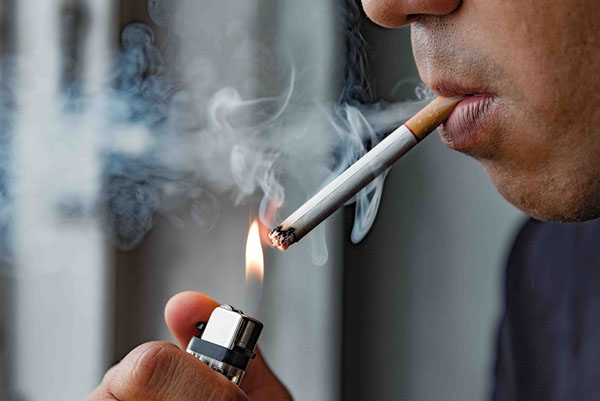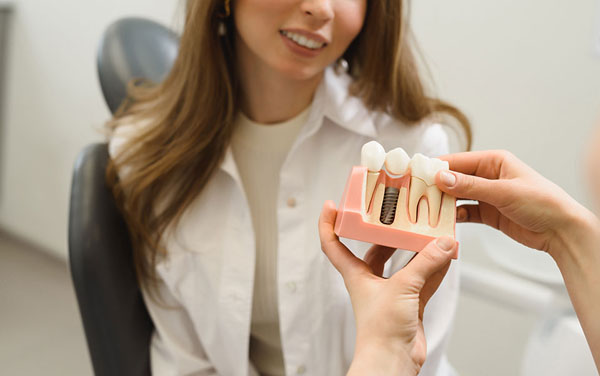Smoking Can Cause Dental Implants To Fail
Can I Get Dental Implants if I Smoke?
Dental implants are the top choice for tooth replacement. However, those who smoke may be wondering if dental implant treatment is right for them.
The short answer is yes, you can get dental implants if you smoke. However, please note that smoking can negatively impact the success of implant treatment. Studies show that smoking can increase the dental implant failure rate.
If you have any questions about dental implants and smoking, contact our Luck dentist today at (715) 472-2211.
Cigarette Smoking Affects Your Oral Health
Smoking has a significant impact on oral health. Here are some of the negative effects that smoking can have on the mouth and teeth:
- Periodontal disease: Smoking is one of the leading causes of periodontal disease. Gum disease is a bacterial infection of the gums and bones that support the teeth. It causes redness, swelling, bleeding, and even tooth loss. Smoking weakens the immune system, making it harder for the body to fight off infections, including gum disease.
- Bad breath: Smoking can cause bad breath, or halitosis, due to the buildup of bacteria and plaque in the mouth. This can be embarrassing and affect a person’s self-confidence.
- Tooth discoloration: Smoking can cause yellow or brown stains on the teeth that are difficult to remove with brushing or professional cleanings.
- Oral cancer: Smoking is a major risk factor for oral cancer. Oral cancer can occur in the mouth, throat, or lips and can be life-threatening if not caught early.
- Delayed healing: Smoking can slow down the healing process after dental procedures, such as extractions, implant placement, or gum surgery. This can increase the risk of complications and infection.
Patients who smoke need to be aware of these negative effects and take steps to reduce their risk. Quitting smoking is the best way to prevent further damage to your oral health. It’s also important to maintain good oral hygiene habits, such as brushing twice a day, flossing daily, and scheduling regular dental checkups and cleanings. By taking these steps, patients can help prevent gum disease, tooth discoloration, bad breath, and other negative effects of smoking on oral health.
How Does Smoking Affect Dental Implants?
Slower Recovery
Smoking can restrict blood flow to the gums and jawbone, slowing the recovery period after a dental implant procedure. This can lead to a longer recovery and make it more difficult for the implant to fuse properly with the jawbone. It can also increase the risk of implant failure, infection, and other oral health complications.
Increased Risk of Implant Failure
Smoking also increases the risk of implant failure. Nicotine and other chemicals found in cigarettes weaken the bone and make it more difficult for the implant to fuse with the bone. Additionally, smoking can increase the risk of developing an infection, leading to implant failure if not treated as soon as possible.
Increased Risk of Infection
Your risk of infection is higher when smoking. Chemicals such as nicotine found in cigarettes can weaken the immune system, making it more difficult for the body to fight off infections. This can lead to implant failure or the need for additional invasive surgeries.
Increased Risk of Peri-Implantitis
Peri-implantitis is a condition that occurs when the tissue around the implant becomes infected and inflamed. Smoking can increase the risk of peri-implantitis, which can lead to implant failure and the need for additional surgeries. Additionally, smokers are more likely to develop periodontal disease, which can further compromise the success of dental implant treatment.
Symptoms of Implant Failure
Dental implant failure is rare, but it does occur, especially for those who smoke and don’t follow post-op care guidelines. If you’re experiencing implant failure, you may notice the following symptoms:
- Inflamed or bleeding gums
- Severe oral pain
- Discomfort while chewing
- Gum recession
- Swelling at the surgical site
- Loose implant or replacement tooth
When you experience the symptoms mentioned above, call our Luck dental implant provider immediately. They’ll get you in as soon as possible and go through the correct course of treatment to get your oral health back on track.
Tips for Quitting Cigarette Smoking
Cigarette smoking affects dental implants and is a major risk factor for early implant failure. Quitting smoking is one of the most important steps a patient can take to improve the success of dental implant placement. Here are some tips for quitting smoking that may be helpful for patients:
- Join a support group: Joining a support group can be a great way to connect with others who are also trying to quit smoking. This can provide encouragement, accountability, and motivation to quit smoking altogether, even after dental implant surgery.
- Use nicotine replacement therapy: Nicotine replacement therapy, such as patches, gum, or lozenges, can help ease cravings and reduce withdrawal symptoms. Talk to a healthcare provider or your implant dentist before starting any nicotine replacement therapy.
- Seek professional help: Healthcare providers can provide resources and support to help patients quit smoking. This may include counseling, medication, or a combination of both.
- Avoid triggers: Triggers, such as stress, alcohol, or being around other smokers, can make it harder to quit smoking. Avoiding triggers and finding healthy ways to cope with stress can increase the likelihood of success.
- Set a quit date: Setting a quit date can provide a clear goal and help patients stay motivated. Choose a date that allows enough time to prepare and gather support.
By implementing these tips, patients who smoke can increase their chances of quitting and improve the success of their dental implant surgery. It’s important to remind patients that quitting smoking is a process and may require multiple attempts, but the benefits to overall health are well worth the effort.
Frequently Asked Questions
Can I smoke before or after the implant procedure?
It’s highly encouraged to avoid smoking before and after your implant procedure. The healing process can be hindered by smoking, and it can increase your risk of implant infection.
How long do I need to quit smoking before and after the implant procedure?
You should quit cigarette smoking at least two weeks before your dental implant procedure. As far as after, consult with your dentist or oral surgeon for specific recommendations.
Can I use nicotine replacement therapy instead of quitting smoking?
No, it’s not recommended. Nicotine replacement therapy can restrict blood flow to the gums and jawbone, negatively impacting the healing process. Discuss smoking or nicotine replacement therapy with your dentist before proceeding with implant treatment.
What is the success rate of dental implants for smokers?
Research indicates that individuals who smoke have a higher risk of implant failure, with rates ranging from 6.5% to 20% compared to non-smokers. The reason for this increased risk is that tobacco and nicotine can lead to constriction or narrowing of blood vessels in the gum tissues of the mouth, which can impede the healing process necessary for successful dental implant integration.
Find Out if Dental Implants Are Best for You
Before receiving dental implants, smokers must commit to quitting before their dental implant treatment and throughout the recovery period. If you can’t stop smoking long enough for treatment, you may consider other tooth replacement options.
If you live in Luck and are considering dental implants, contact our dentist today. With years of experience in implant dentistry, we’ll help you determine the best tooth replacement option for you.


